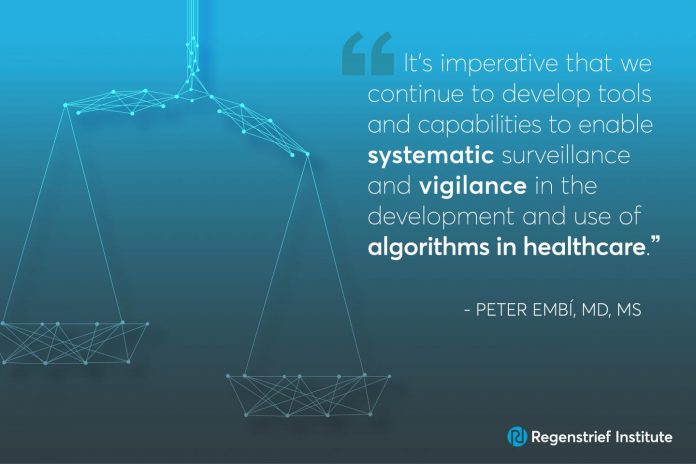Artificial intelligence (AI)-driven healthcare has the potential to transform medical decision-making and treatment, but these algorithms must be thoroughly tested and continuously monitored to avoid unintended consequences to patients.
In a JAMA Network Open Invited Commentary, Regenstrief Institute President and Chief Executive Officer and Indiana University School of Medicine Associate Dean for Informatics and Health Services Research Peter Embí, M.D., M.S., strongly stated the importance of algorithmovigilance to address inherent biases in healthcare algorithms and their deployment. Algorithmovigilance, a term coined by Dr. Embí, can be defined as the scientific methods and activities relating to the evaluation, monitoring, understanding, and prevention of adverse effects of algorithms in healthcare.
“We wouldn’t think of treating patients with a new pharmaceutical or device without first ensuring its efficacy and safety,” said Dr. Embí. “In the same way, we must recognize that algorithms have the potential for both great benefit and harm and, therefore, require study. Also, compared with drugs or devices, algorithms often have additional complexities and variations, such as how they are deployed, who interacts with them, and the clinical workflows where interactions with algorithms take place.”
The commentary was in response to a study from IBM scientists evaluating different approaches to debiasing healthcare algorithms developed to predict postpartum depression. Dr. Embí stated the study suggests that debiasing methods can help address underlying disparities represented in the data used to develop and deploy the AI approaches. He also said the study demonstrates that the evaluation and monitoring of these algorithms for effectiveness and equity is necessary and even ethically required.
“Algorithmic performance changes as it is deployed with different data, different settings and different human-computer interactions. These factors could turn a beneficial tool into one that causes unintended harm, so these algorithms must continually be evaluated to eliminate the inherent and systemic inequities that exist in our healthcare system,” Dr. Embí continued. “Therefore, it’s imperative that we continue to develop tools and capabilities to enable systematic surveillance and vigilance in the development and use of algorithms in healthcare.”








